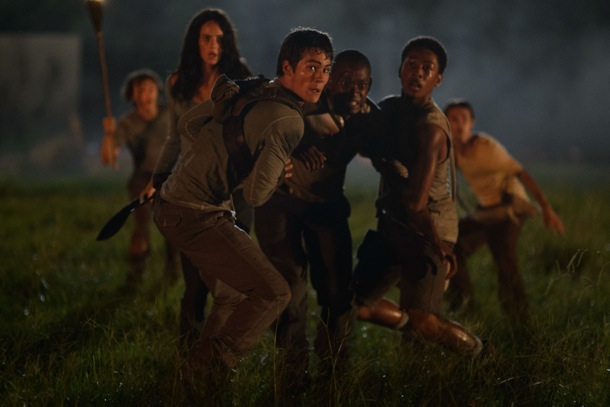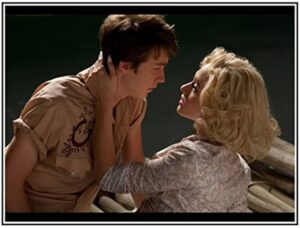 In the past several years, I’ve gone through what, to me, had to be three of the most disappointing Young Adult trilogies ever.
In the past several years, I’ve gone through what, to me, had to be three of the most disappointing Young Adult trilogies ever.
Those three are the Divergent series, the Maze Runner series and the Hunger Games series.
Wait…what?
Surprised? Yeah, they’re three of the most popular dystopian YA series of recent years. They sell more books in a week than I’ll sell in two lifetimes. They’ve launched or are launching movie franchises that will gross into the bazillion dollar range.
And they’re all very well written and enjoyable.
I did not say they weren’t good – hell, I think The Hunger Games is a 21st Century Red Badge of Courage and Catching Fire a 21st Century All Quiet on the Western Front and deserve to be studied alongside them – I said I found them disappointing.
And here’s why.
SPOILERS ABOUND!
Why Do You Build Me Up….
Suzanne Collins, Veronica Roth, and James Dashner are expert world builders. Panem is a well-envisioned society whose development is deliberately stunted by the tyrannical Capitol. The world of the Factions is believable and fascinating. The Glade is a peek at what The Lord of the Flies might have been like if the asshole to cool guy ratio had been a little better. They’re all functional, but imperfect societies and leave the reader wanting to discover more.
Let’s start with The Hunger Games. I don’t think there is a single character we meet in District 12 who couldn’t have a good story told about them. You want to know more about Gale’s brothers. Each of the characters in the Hob has a backstory that’s hinted at. Hell, I’d sit down and read a book about Greasy Sae’s childhood. These are good characters and have so much to discover.
Then as we move on beyond the fence, we have eleven other Districts out there. Each of them have their own culture, their own values, and their own stories to tell. We get some little hints about these cultures during Katniss and Peeta’s tour, and from other tributes, but there are huge gaps that could be filled, and stories that could be told.
Moving on to Roth’s dystopian Chicago, each of the factions has a very defined role in society and they all depend on each other for survival. We are told early on how this arrangement came to be, and it’s one of those rare creatures in Sci-Fi: a dystopian origin that is vague without being annoyingly so; we don’t know how the world blew up, but we how society pulled itself back up afterward, which is the important thing.
I’d even go so far as to dispute the “dystopian” label for the world of the Factions. I’d argue it’s almost a Utopia as it’s actually set up. Everything works, and everyone has their place. And it’s not oppressively caste-oriented either. You choose your own future. You decide what faction you want to belong to and if you pass the test you are in.
There’s a lot to be explored here. Why would anyone want to choose Abnegation? What really sets Dauntless apart? Does being in Candor really give you the right to be as much of a douchebag as you want? Again, there’s room for lots of stories to be told.
Next let’s check out the Gladers. These amnesiac boys have built their own little society in the center of a labyrinth. We are told about nearly a dozen different jobs that the boys are divided up into and we get hints of how boys end up in those jobs. Society thrives. If it weren’t for the Runners who go out into the maze trying to find a way out there would be no contact with the Grievers at all and everyone could live reasonably happy ever after.
Three well imagined, well planned, well structured worlds with lots of stuff to explore.
And they’re all completely and irrevocably destroyed by the end of the second book (or in the case of Divergent and The Maze Runner, two thirds of the way through the first).
…Just to Let Me Down?
 Mockingjay is a complete departure from the formula of the other Hunger Games books. It’s the story of the new rebellion and the fall of the Capitol. The Districts cease to exist as they are, and we hardly even visit District 12 at all until the very end. Plus, the characters that everyone loves are all killed or mentally raped before the end. Nothing Will Ever Be the Same.
Mockingjay is a complete departure from the formula of the other Hunger Games books. It’s the story of the new rebellion and the fall of the Capitol. The Districts cease to exist as they are, and we hardly even visit District 12 at all until the very end. Plus, the characters that everyone loves are all killed or mentally raped before the end. Nothing Will Ever Be the Same.
The world of the Factions is falling apart before the end of Divergent. Abnegation is almost completely destroyed. A proper civil war is brewing. Four and Tris have to try and put things back together. By the time we get to Allegiant, the Factions and their story are proven to be essentially a lie, and a Midichlorian-sized macguffin is given for how they got that way.Things have changed so much that we now have two POV characters and two different stories to follow: Four’s and Tris’. (This is not a bad thing, by the way.) Everything you wondered about, and wanted to know more about, no longer exists. Nothing Will Ever Be the Same.
Dashner proves pretty early on that he is not fooling around. He quite openly and happily destroys life in the Glade starting at the halfway point of the first book. By the end, it’s completely fallen apart and even the Maze itself is out of the picture. A whole new challenge awaits. Nothing Will Ever Be the Same.
Which leads me to ask: why spend so much time world building if you’re only going to blow it all up?
Why tempt us with histories of the people of District 12? Why give us such tantalizing glimpses of Candor, Erudite, Amity, and the other Factions if you’re just going to not only destroy them but the reason for them existing? Why discuss the roles each boy plays in the Glade if those roles become irrelevant before the third Act of the story begins?
And Then Worst of All….
 It really doesn’t have to be that way. Let’s look at another hot fantasy YA series, the Caster Chronicles. Kami Garcia and Margaret Stohl also built an expansive and fascinating universe with well-rounded characters and intricately designed supernatural species. The first book ends with the Nothing Will Ever Be the Same moment, when it looks like everything we knew was wrong, but the rest of the series is all about restoring the order of things. When the story reached its logical end in Beautiful Redemption, not only had all the characters grown and matured, but everything had been put back the way it was before it was broken. None of the characters will be the same again, but the world will!
It really doesn’t have to be that way. Let’s look at another hot fantasy YA series, the Caster Chronicles. Kami Garcia and Margaret Stohl also built an expansive and fascinating universe with well-rounded characters and intricately designed supernatural species. The first book ends with the Nothing Will Ever Be the Same moment, when it looks like everything we knew was wrong, but the rest of the series is all about restoring the order of things. When the story reached its logical end in Beautiful Redemption, not only had all the characters grown and matured, but everything had been put back the way it was before it was broken. None of the characters will be the same again, but the world will!
Garcia and Stohl have decided to do a spin-off series following two fan-favorite supporting characters (Link and Ridley) as they set off on new misadventures. But if they hadn’t, there was still a Caster World intact enough that readers would know that there could be hundreds of more stories out there if someone wanted, and all they had to do was dream it all up. (Provided a Linkubus didn’t snatch it away from you while you slept.)
Don’t Break My Heart
The dystopian trend in YA is not a bad thing at all. It has brought millions of young readers into the world of Science Fiction, touching upon the “hard sci-fi” aspects of mid 20th Century writers.
But for those of us who have been around the Sci-Fi block a few times and remember the elaborate worlds created by some of the “old school” writers like Niven, Pournelle, Asimov, Heinlein, and Dick, it’s a letdown. There are hundreds of stories set in Niven’s Known Space universe. So many stories grew out of Asimov’s robot stories. Yet each of these new universes exist solely to tell one story, and that story ends up destroying everything.
Panem was created solely so Katniss Everdeen could destroy it. The Factions were created solely so Beatrrice Prior and Tobias Eaton can shut it all down. The Glade exists solely as a place for Thomas to spend some time in before it disappears. Powerful stories, yes, but they needlessly destroy their worlds just to develop one character fully.
There are stories out there that could be told. I want to know those stories. I want to explore those worlds. And they are destroyed. That is why I am disappointed.
Writers remember: you may create the characters, but if they’re well crafted they have lives beyond what you put on paper or the screen. You may build the worlds, but they grow and evolve. Please don’t treat them like window dressing. They deserve better. At least leave room for their stories to grow in people’s minds, even if not on the page.
Leave a Comment